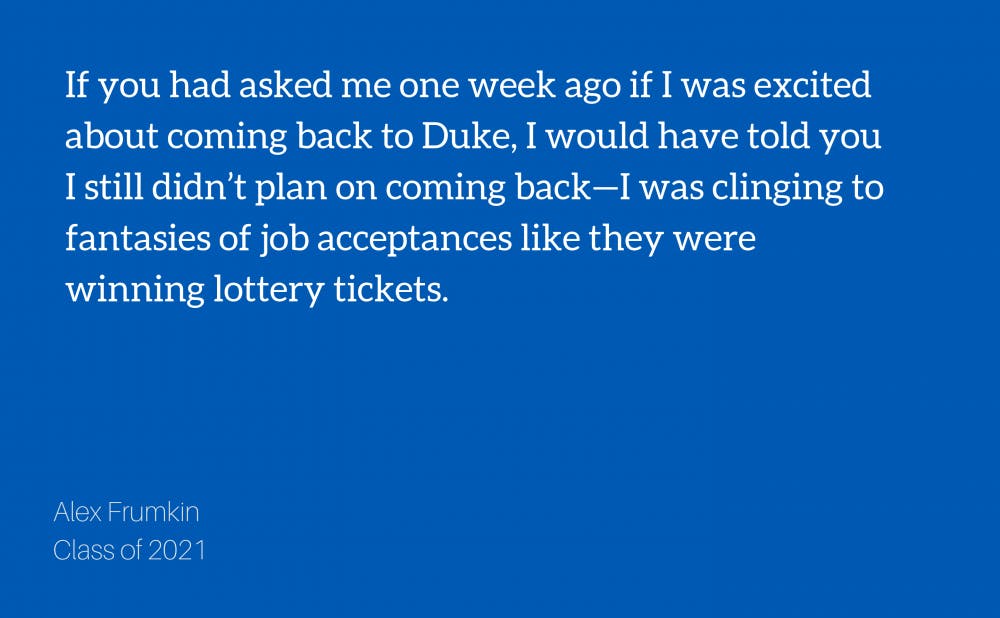When I first applied to Duke, I honestly didn’t think too much about it. I applied to highly-ranked schools almost systematically, and Duke was ranked highly (I also loved basketball, so its elite program was a bonus).
When the dust cleared and Duke was the top choice that accepted me, I was surprised because I never seriously thought about coming here. But when I visited for Blue Devil Days after Ubering from RDU, something just clicked in my mind. From my first steps on campus, I could feel the atmosphere percolate with beauty, intellect and even a sense of homeliness. I saw myself spending the next four years here, and I couldn’t have been happier that I found Duke.
Two years later, I am halfway through my time at Duke. And as much as I loved my first two years as a Blue Devil, I quickly came to realize that the world ain’t all sunshine and rainbows. I’ve never been the best at managing stress and anxiety, and my time at Duke induced them in levels that I simply couldn’t handle. By the end of sophomore year, I started thinking about taking a gap year very seriously.
At first, I framed it around the timing and the particular opportunity I was trying to pursue. But when I realized in early June that I would probably never hear back from my dream job, I started considering why I truly wanted to take a gap year. I concluded that I needed to get out of the “Duke bubble,” and I came to this conclusion by comparing my anxiety inside and outside of a Duke-facilitated environment. But I started to question this reasoning when I felt no anxiety during an internship that was completely coordinated by Duke.
After a few weeks of rest post-finals this past May, I spent two months in Miami through DukeEngage. We stayed on the University of Miami’s campus, so while there were some logistical barriers from the city’s livelihood, the experience felt fairly immersive. By staying busy with work and social outings, there were moments where I would forget that Duke planned this entire program. And even when I recognized Duke’s role in this opportunity, I never felt encapsulated in a bubble the way I did on campus.
While there were no obvious physical manifestations of Duke’s influence within the cityscape of Miami, and I certainly was not taking courses taught by Duke professors, there must have been some other reason why I never felt constantly overwhelmed when so many of my experiences there had a direct connection to this university. If you ask me, those representations of Duke only tell part of the story because the bubble is entirely mental. Constant physical reminders of Duke aren’t helpful, but they only make you feel trapped if you’re already overwhelmed—the “Duke bubble” is simply the overwhelming feeling associated with our lifestyles at Duke.
Maybe I’m being really naive by allowing myself to have this realization while I’m not taking classes or spending time in Durham, but my clear-headedness through eight weeks under Duke’s supervision proves to me how artificial the bubble is. That doesn’t mean it isn’t real; classes are just starting, and I can already feel surrounded again. But what it does mean is that maybe we can escape without leaving it physically. We already do this one way or another, whether it’s through clubs, exercise, parties, music or whatever you do to help cope; the problem with coping mechanisms is that they’re only short-term solutions.
Most of us do these things as a reaction to stress when they should really become integral parts of our lifestyle—as important as meals, sleep and classes. We react when we’re overwhelmed, but the only way to stop feeling trapped is to make sure we take care of ourselves before we even get overwhelmed in the first place.
Do I believe that I can honestly do this for myself? No. At least not right away. With my obsessive personality and my tendency to fall into unhealthy patterns, I know that I have a lot of work to do before I can be a Duke student without being part of the bubble. But for once, I feel like doing that work is actually possible. For the few days I had on campus before classes started, I took steps to implement healthy habits that I hope to continue through the semester if not longer. I’m afraid that my lifestyle will immediately worsen once I get into the weekly routine of classes, yet I have the hope to keep trying—unlike in past years. And I’m confident I wouldn’t have that hope if I didn’t come back to Duke.
If you had asked me one week ago if I was excited about coming back to Duke, I would have told you I still didn’t plan on coming back—I was clinging to fantasies of job acceptances like they were winning lottery tickets. This whole time I thought getting away would solve my problems; but rather, it would probably only push them off just like all my other coping mechanisms. I seriously doubted my ability to succeed if I didn’t take a gap year, but as soon as I got to my dorm room, I felt surprisingly ready to take on junior year. Now I can let myself find the Duke I know again before I let it slip away.
Alex Frumkin is a Trinity junior. His column, “lost in the world,” runs on alternate Tuesdays.
Get The Chronicle straight to your inbox
Signup for our weekly newsletter. Cancel at any time.

